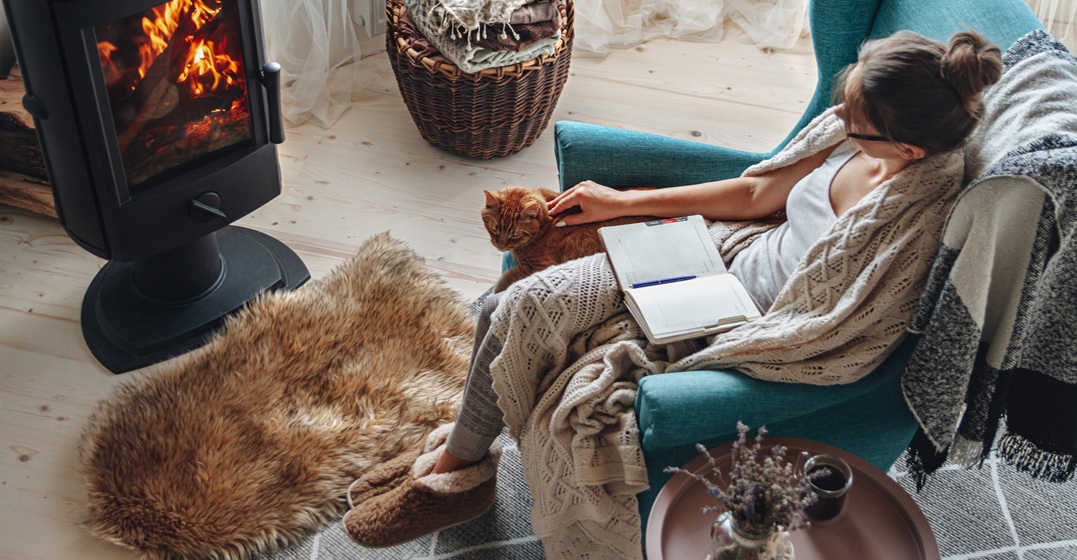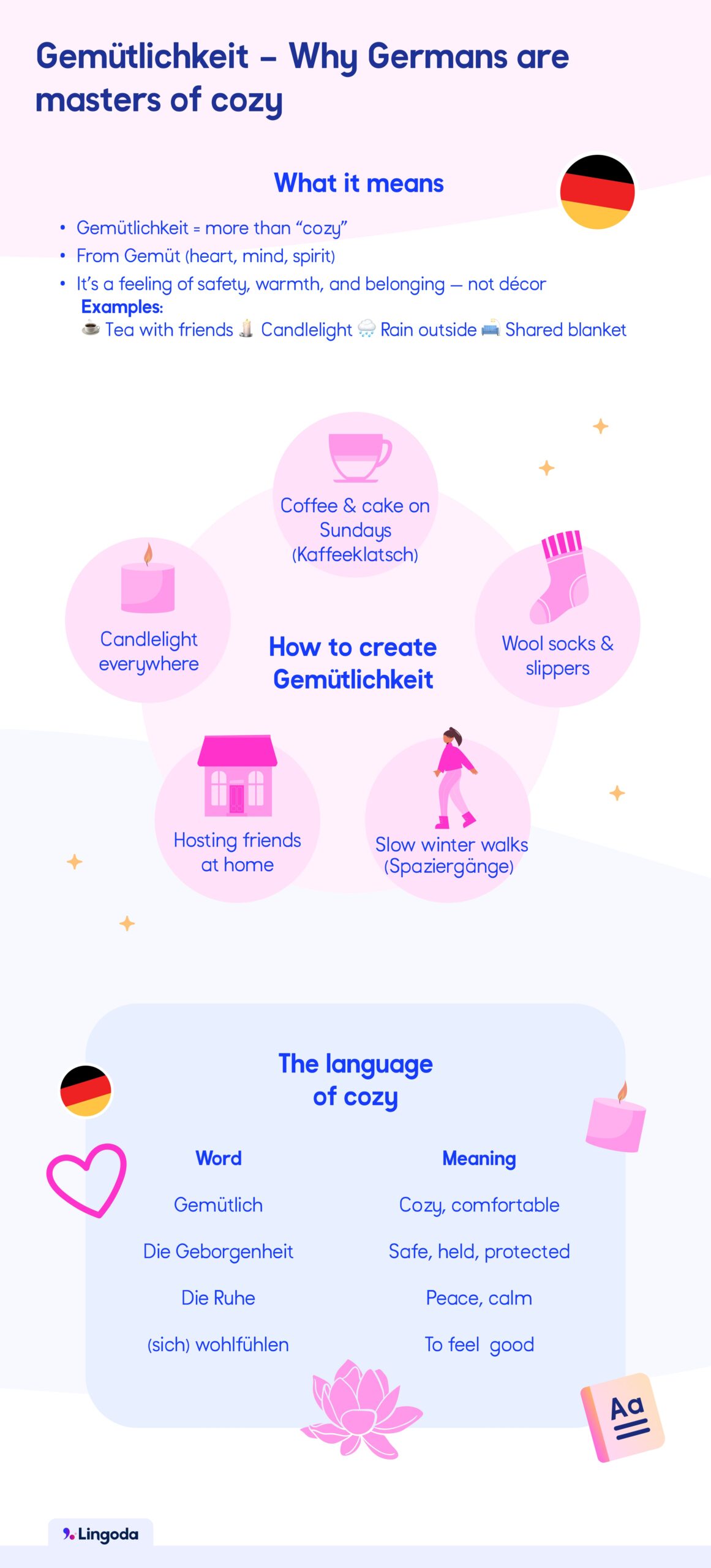‘Gemütlichkeit’: Why Germans are masters of cozy
As Germany’s short autumn transforms into winter, saunas re-open, candles flicker, steam curls from mugs of tea and the scent of baked apples drifts through the air. Outside, the frenzy of the warmer months slows down. Inside, countless Germans welcome the season perfectly at peace.

This sense of peace — and the Germans’ secret for passing the cold, dark months of winter in relative harmony — boils down to a single word: Gemütlichkeit. Though nearly untranslatable, Gemütlichkeit blends an elusive sense of comfort, calm and connection. But this isn’t just another cosy trend to track on Pinterest. It’s a mindset quietly woven into everyday life in Germany. To understand Gemütlichkeit, you have to feel it.
- What ‘Gemütlichkeit’ really means (and why it’s untranslatable)
- Why ‘Gemütlichkeit’ matters in German culture
- How Germans create ‘Gemütlichkeit’ (and how you can bring it home)
- The language of cozy: Words expats will love
What ‘Gemütlichkeit’ really means (and why it’s untranslatable)
There’s no clean translation for Gemütlichkeit. “Cozy” comes close, but “cozy” mostly refers to textures and visuals — soft blankets, warm light, fuzzy socks and the like. Gemütlichkeit means something altogether deeper. Derived from Gemüt (the German word for heart, mind and spirit), it signifies a mixture of inner balance and quiet joy that fills both space and mood.
Gemütlichkeit is more about how you feel in a certain space than what that space looks like. Yes, visuals play a role, but what really matters is a physical and emotional sense of ease and security. It’s that cottage-core, homey feeling of friends chatting softly over tea or sharing a blanket while rain taps gently on the window. It’s the sense that everything is safe and warm and enveloping, almost like a mother’s womb.
Perhaps more than anything, Gemütlichkeit is Germany’s gentle reminder that happiness doesn’t have to be loud. It can be as simple as feeling at home, regardless of where you are in the world.

Why ‘Gemütlichkeit’ matters in German culture
Germans live according to predictable rhythms. Work efficiently, rest deliberately. Gemütlichkeit fits right into that balance, reminding people that calm is just as valuable as productivity. It’s the cultural permission slip to slow down.
You can see it everywhere: in Feierabend, the sacred moment when work truly ends; in Ruhezeit, the legally protected quiet hours that hush the neighborhood; and in Sonntagsruhe, those peaceful Sundays when shops stay closed and streets fall silent. To outsiders, it can feel strange, as if the country collectively presses pause once a week. But that’s exactly the point.
Germany builds rest into its routine — not in a self-indulgent way, but with a smoothness that allows mental space and harmony. Coziness isn’t seen as a guilty pleasure or a weekend reward, but rather as a cornerstone of wellbeing, and a reminder that feeling good and doing good work are nigh inseparable.
How Germans create ‘Gemütlichkeit’ (and how you can bring it home)
Gemütlichkeit is truly part of how German communities move through daily life. It involves a series of small rituals that bring warmth and calm to long winters. Fortunately, these are easy to make your own, wherever you might be.
1. Candlelight everywhere
Soft, warm light is the foundation. Candles are often seen glowing on breakfast tables, desks and even windowsills in the evening.
2. Coffee and cake on Sundays (‘Kaffeeklatsch’)
A slow afternoon with friends, a slice of cake and no rush. During the holidays, it’s often homemade cookies and a chat that stretches for hours around an oven that fills the kitchen with warmth and spicy aromas.
3. Wool socks and slippers
Comfort starts at home — and, more specifically, at your feet. Germans typically have an extra pair of Hausschuhe to offer their guests.
4. Slow winter walks (Spaziergänge)
Brisk air, quiet streets, clear thoughts. No agenda, just movement and calm.
5. Seasonal cooking
Soups simmer, apples bake, spices fill the air. Warmth becomes something you can taste. The benefit of a long winter night? Once darkness descends in the afternoon, there’s still time to cook, have a glass of wine, eat, brew tea, wash dishes, watch a movie, shower and go to sleep by 10 p.m.
6. Reading corners
A blanket, a lamp, a comfy chair or cushion. Every home has one — or should.
7. Hosting friends at home
Simple food, soft light, board games and laughter that doesn’t need to be loud. And, yes, you may choose to provide your guests with woolly socks or sleepers (though many bring their own).
8. Soft music or playlists
Gentle soundtracks are the basis of winter, offering sonic accompaniment while you draw, read, build a puzzle, play chess or write in your journal.
9. Christmas or seasonal markets
Mulled wine, good (and caloric) food, scarves wrapped tight and familiar faces in the cold.
Remember, Gemütlichkeit isn’t about making a statement with flamboyant decoration. It’s about intention — time, care, kindness and togetherness.
The language of cozy: Words expats will love
German has a whole vocabulary related to comfort. Some of the most important words are:
- Gemütlich — cozy, relaxed, pleasant
- Behaglich — snug, comfortably warm
- (die) Geborgenheit — a deep sense of safety and being held
- (sich) wohlfühlen — simply feeling good; content in body and mind
- (die) Ruhe — peace, quiet, calmness
Each adds a layer to the warmth that fills German life. For expats, learning these words goes beyond simple vocabulary and into the details: the soft voices, the slow moments and the charming way in which comfort is built into the rhythm of everyday life.
‘Gemütlichkeit’: The art of feeling at home
Gemütlichkeit is Germany’s quiet art of being at ease and finding comfort in the small things and the people around you. It’s not a luxury, and it’s certainly not a trend. It’s simply mindfulness turned into habit — a way of living that values calm as much as activity.
Once you start noticing it, you’ll see Gemütlichkeit everywhere: in the glow of a café window, in the hush of a Sunday walk, in the warmth of company on a cold night. And maybe, without realizing it, you’ll start to feel a little more at home, too.













